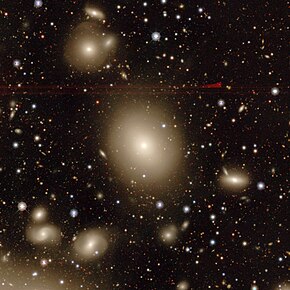NGC 3308
Appearance
| NGC 3308 | |
|---|---|
 legacy surveys image of NGC 3308 | |
| Observation data (J2000 epoch) | |
| Constellation | Hydra |
| Right ascension | 10h 36m 22.4s[1] |
| Declination | −27° 26′ 17″[1] |
| Redshift | 0.011855[1] |
| Heliocentric radial velocity | 3554 km/s[1] |
| Distance | 174 Mly (53.3 Mpc)[1] |
| Group or cluster | Hydra Cluster |
| Apparent magnitude (V) | 12.94[1] |
| Characteristics | |
| Type | SAB0-(s)?[1] |
| Size | ~108,100 ly (33.15 kpc) (estimated)[1] |
| Apparent size (V) | 1.7 x 1.3[1] |
| Other designations | |
| ESO 501-34, MCG -4-25-32, PGC 31438[1] | |
NGC 3308 is a lenticular galaxy with a faint bar[2] located about 174 million light-years away[3] in the constellation Hydra.[4] NGC 3308 was discovered by astronomer John Herschel on March 24, 1835.[5][6] It is a member of the Hydra Cluster.[7]
See also
[edit]References
[edit]- ^ a b c d e f g h i j "NASA/IPAC Extragalactic Database". Results for NGC 3308. Retrieved 2018-05-03.
- ^ "Detailed Object Classifications". ned.ipac.caltech.edu. Retrieved 2018-05-04.
- ^ "Your NED Search Results". ned.ipac.caltech.edu. Retrieved 2018-05-04.
- ^ "Revised NGC Data for NGC 3308". spider.seds.org. Retrieved 2018-05-04.
- ^ Gottlieb, Steve. "Astronomy-Mall: Adventures In Deep Space NGC objects 3001-3999". Astronomy-Mall. Retrieved 2018-04-27.
- ^ "New General Catalog Objects: NGC 3300 - 3349". cseligman.com. Retrieved 2018-05-04.
- ^ Richter, O.-G. (February 1989). "The Hydra I cluster of galaxies. V - A catalogue of galaxies in the cluster area" (PDF). Astronomy and Astrophysics Supplement Series. 77: 237–256. Bibcode:1989A&AS...77..237R.
External links
[edit]- NGC 3308 on WikiSky: DSS2, SDSS, GALEX, IRAS, Hydrogen α, X-Ray, Astrophoto, Sky Map, Articles and images
